Venezuelan President Nicolas Maduro announced on August 16 that he would withdraw the country's ambassador from Egypt because of the conflict there and confrontations between supporters of the Muslim Brotherhood and the defacto government, which has seen over 700 people killed. "We have witnessed a blood bath in Egypt." Maduro said. "We warned that the coup against Morsi was unconstitutional ... the responsible party for what is occuring in Egypt is the empire." He said: "The United States doesn't have friends, it has interests, and what it wants is to control the planet".
-
-
Millions protesters of were again in the streets of Cairo and other Egyptian cities on July 26, both for and against the former Muslim Brotherhood government. Security forces attacked the pro-Morsi protesters, killing many in a fresh massacre. Ahram Online reported that these were the largest mobilisations since the June 30 protests that brought down the elected, but increasingly unpopular, Muslim Brotherhood-aligned government of President Mohamed Morsi.
-
The Egyptian army massacred 53 protesters who were calling for the release from detention and reinstatement of overthrown president Mohamed Morsi on July 8.
-
In Green Left Weekly #972, Tony Iltis wrote on the huge protests against the Morsi government, the military intervention that removed it and the immediate aftermath. These events, hailed by many on the Egyptian left as a “second revolution”, have sparked widespread debate around the world. Below, Tim Dobson, presents a different view of the events ― one that argues it was an outright reactionary coup. You can also read Iltis's most recent piece.
-
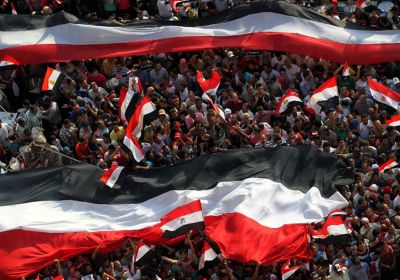 The Socialist Alliance released this statement on July 12. *** The Socialist Alliance recognises and welcomes the June 30-July 3, 2013, popular mobilisations of the Egyptian people, led by youth, for democracy, human rights and social and economic justice that brought down the regime of President Mohamed Morsi and the Muslim Brotherhood.
The Socialist Alliance released this statement on July 12. *** The Socialist Alliance recognises and welcomes the June 30-July 3, 2013, popular mobilisations of the Egyptian people, led by youth, for democracy, human rights and social and economic justice that brought down the regime of President Mohamed Morsi and the Muslim Brotherhood. -
 The Refugee Action Coalition released this statement on July 6. *** The pilot of an Etihad airliner at Sydney thwarted government attempts to deport an Egyptian asylum seeker on July 5, when the pilot asked for the protesting asylum seeker to be taken off the plane. Urgent attempts are now being made to get a stay on his removal because of the military coup in Egypt, and the changed political situation there.
The Refugee Action Coalition released this statement on July 6. *** The pilot of an Etihad airliner at Sydney thwarted government attempts to deport an Egyptian asylum seeker on July 5, when the pilot asked for the protesting asylum seeker to be taken off the plane. Urgent attempts are now being made to get a stay on his removal because of the military coup in Egypt, and the changed political situation there. -
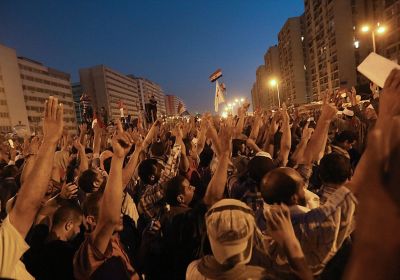 The protests which began on June 30 ― and by July 3 had led to the overthrow of President Mohamed Morsi ― were reportedly the largest in Egyptian history. With claims that between 10 and 20 million people took part, they were larger than the protests which led to the overthrow of President Hosni Mubarak on February 11, 2011.
The protests which began on June 30 ― and by July 3 had led to the overthrow of President Mohamed Morsi ― were reportedly the largest in Egyptian history. With claims that between 10 and 20 million people took part, they were larger than the protests which led to the overthrow of President Hosni Mubarak on February 11, 2011. -
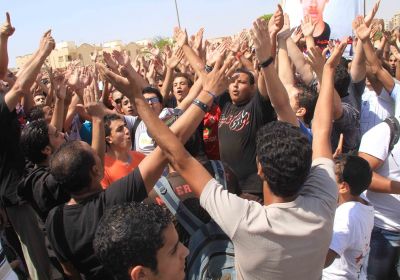 If you want to understand why Egyptian President Mohamed Morsi has declared a “state of emergency” or if you want to understand why the country’s defence minister warned on January 29 of “the collapse of the state”, you first need to understand the soccer fan clubs in Egypt - otherwise known as the “ultras” - and the role they played in the revolution that toppled Hosni Mubarak in 2011.
If you want to understand why Egyptian President Mohamed Morsi has declared a “state of emergency” or if you want to understand why the country’s defence minister warned on January 29 of “the collapse of the state”, you first need to understand the soccer fan clubs in Egypt - otherwise known as the “ultras” - and the role they played in the revolution that toppled Hosni Mubarak in 2011. -
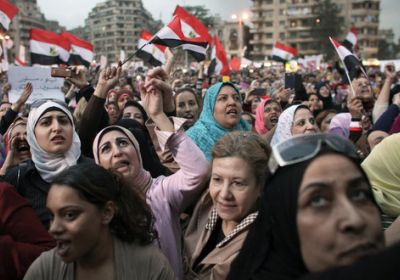 Egyptians again rise against tyranny and dictatorship. Politically, they have made significant gains from the street pressure, leading to a significant retraction from President Mohamad Morsi. But his concessions are superficial. By and large, the Muslim Bortherhood's Morsi stubbornly continues to follow in the footsteps of his predecessor Mubarak. If the recent history is any predictor of the future, Morsi’s future looks bleak.
Egyptians again rise against tyranny and dictatorship. Politically, they have made significant gains from the street pressure, leading to a significant retraction from President Mohamad Morsi. But his concessions are superficial. By and large, the Muslim Bortherhood's Morsi stubbornly continues to follow in the footsteps of his predecessor Mubarak. If the recent history is any predictor of the future, Morsi’s future looks bleak. -
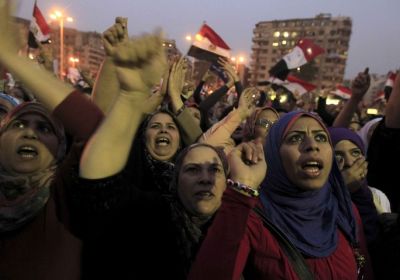 Anger has erupted on Egypt's streets and lead to a new occupation of Cairo's iconic Tahrir square — the centre of mass protests that brought down dictator Hosni Mubarak last year. Just days after being lauded by many for his role in brokering a ceasefire between Israel and Hamas, Egyptian President Mohamed Morsi issued a series of constitutional decrees that provoked the protests. There were also large protests on December 1 in defence of Morsi and his decrees.
Anger has erupted on Egypt's streets and lead to a new occupation of Cairo's iconic Tahrir square — the centre of mass protests that brought down dictator Hosni Mubarak last year. Just days after being lauded by many for his role in brokering a ceasefire between Israel and Hamas, Egyptian President Mohamed Morsi issued a series of constitutional decrees that provoked the protests. There were also large protests on December 1 in defence of Morsi and his decrees. -
As soon as Israel attacked Gaza in its “Operation Pillar of Defence”, it was clear the context in which its war was launched was very different from “Operation Cast Lead” in 2008-09. The shift in regional context is largely due to the Arab Spring, which has shaken the Middle East. The most concerning development from Israel's point of view was Egypt's January 25 revolution, which overthrew US- and Israel-backed dictator Hosni Mubarak last year.
-
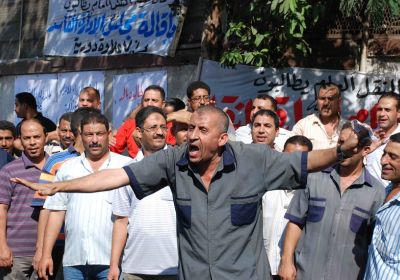 Egypt is being hit by a strike wave as the government comes under pressure to push austerity measures. However, the protests getting the most international attention are the ones against The Innocence of Muslims film. Like countries across the world, Egypt Islamaphobic film. But the Egyptian protests, which targetted the US embassy, took on a different dynamic due to the revolution that toppled dictator Hosni Mubarak.
Egypt is being hit by a strike wave as the government comes under pressure to push austerity measures. However, the protests getting the most international attention are the ones against The Innocence of Muslims film. Like countries across the world, Egypt Islamaphobic film. But the Egyptian protests, which targetted the US embassy, took on a different dynamic due to the revolution that toppled dictator Hosni Mubarak.